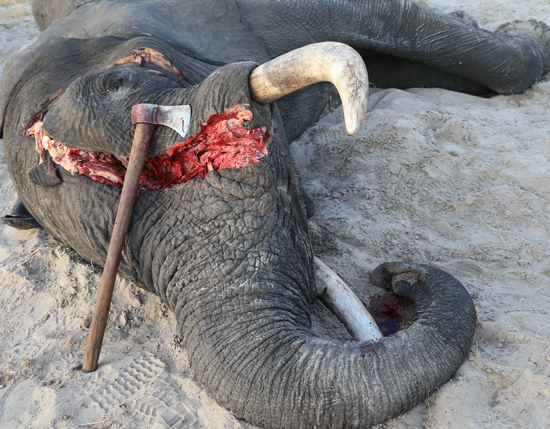
Jumbos looking up after China announces ban on ivory trade

By Musa Carter
10 January 2017 – The Namibian Professional Hunting Association (NAPHA), has welcomed the move by China to ban all domestic ivory trade and processing and sincerely hopes that this proposed embargo be expanded to include many other threatened species.
China recently announced the ban on all domestic ivory trade and processing by the end of 2017, a move described by activists as a potential ‘game changer’ for African elephants.
NAPHA this week said that if indeed executed, the closing down of the Chinese ivory market would go a very long way to ensure the survival of African elephants.
In response to questions from the Economist the association said that the announcement, however, must be followed by many caveats and they put forward questions to whether the Chinese government will police and enforce this proposal vigorously.
“If they do not, the black market in ivory trade will merely continue unabated, with the price of ivory increasing, making elephant poaching even more lucrative, as it is with the rhino horn market and with the drug trade market,” they added.
Again the association further questioned whether neighboring countries such as Vietnam and Myanmar will follow suit? “If not, the Chinese will just source their ivory from these countries and poaching will continue,” NAPHA said.
According to the hunters association, the Chinese embargo on elephant trading will be of great benefit to Namibia, the Namibia Professional Hunting Association and trophy hunting in general.
“The number of Chinese trophy hunters is negligible when compared to hunters from other countries. In addition, the number of elephants hunted by international trophy hunters is negligible when compared to other forms of elephant mortalities (such as poaching, natural deaths, human/ wildlife conflict). This embargo will, however, lessen the pressure on our local elephant populations, which will benefit, above all, our elephants,” they added.
Meanwhile, the association explained that it must be clearly stated that legal, ethical hunting and poaching are two diametrically opposed concepts and NAPHA strongly condemns and acts against all poaching that it encounters.
“In fact, NAPHA, has already engaged in recruiting and training members of Communal Conservancies in Namibia to conduct anti–poaching operations in Northern Namibia and NAPHA is heavily involved in anti–poaching initiatives throughout Namibia,”they added.
Regarding trophy hunting, the association said that in terms of the effect that this proposed closure will have on Namibia and NAPHA, the simple answer is “none”.
“In reality, this step taken by China will in fact, go a long way to benefit both Namibia and NAPHA in that we shall hopefully see an increase in the elephant population,” NAPHA said implying that a growing indigenous elephant population offers more huntable trophy animals.
Furthermore, in terms of seeing a “reduction of hunting activities in Namibia”; the association reiterated that hunting and poaching are not the same thing.
“Few, if any Chinese nationals have hunted elephant legally in Namibia over the last few years and the bulk of our trophy hunters come from Europe and the USA. In other words, the effect that this embargo will have on legitimate, legal and ethical trophy hunting will be negligible,” they explained.
In conclusion, the association said that any activities undertaken which threaten the sustainable utilization of the country’s natural resources will be strongly condemned by NAPHA and they will continue to support the authorities.










































